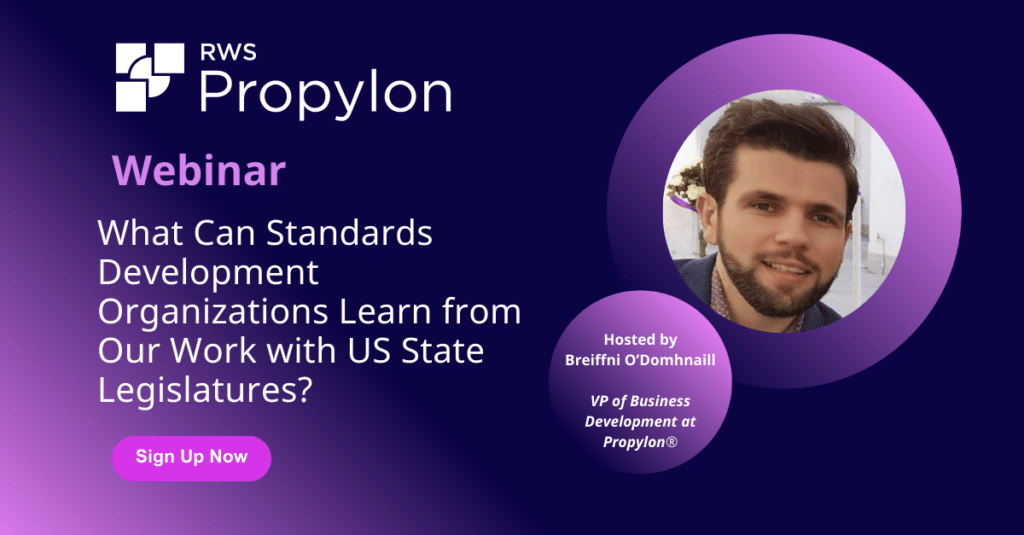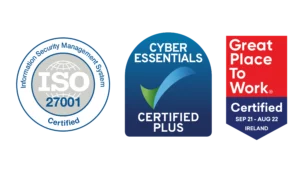While to some, Standards Bodies and Legislatures may seem like worlds apart, our experience has taught us that they are much closer than you may have originally thought. The complexities of version management for drafting proposed changes, content re–use, formal amendment cycles, versioned publishing, and ultimately, producing outputs that are accessible and useful for people who want to understand changes to the law, are the same set of technical challenges that exist in the world of standards management and publishing today.
It is understood that longevity in any industry will undoubtedly lead to constant learning and adaptation as time progresses and your experience expands. That is why we can confidently say that our two decades of experience in working with Legislatures and Parliaments has taught us a lot. In this article, we will explore some of the key lessons we have learned and how these lessons can greatly benefit our work with Standards Bodies.
Disrupting the legal and regulatory publishing landscape with innovative solutions that simplify the complex and connect people with the law” has been the Propylon vision that drives what we do daily.
Lesson 1
The formal processes for creating and updating standards are remarkably similar to the formal processes for creating and updating laws. Both worlds need a platform that can handle the rigorous due processes for each.
The formal processes for creating standards and laws are quite similar. For example, ANSI’s due process requirements require you to demonstrate you had an open, balanced, and collaborative process in establishing the proposed standard. Essentially, the process needs to be transparent and democratic in nature, similar to lawmaking. Our platform allows organizations to remain transparent at all stages of their standards creation and lawmaking processes. It gives users the ability to track a detailed version history and quickly understand how content has changed over time. Organizations can rely on a single source of truth with a comprehensive audit trail of all changes. The platform also allows multiple collaborators to work on the same document and see everyone’s changes in real-time which demonstrates an open, collaborative effort.
Lesson 2
Committee-based collaboration requires a modern digital first technology approach that is easy to use for those involved.
Our work in the worlds of managing and publishing standards and legislation has taught us that committee-based collaboration is key. Legislatures and Standards Bodies follow a similar, rigorous due process when creating or updating laws, regulations, and standards. One key element of this is that everyone has the right to have their opinion heard and to work collaboratively on the end result. Committee and chamber sessions, including voting in legislatures and balloting in standards organizations, is central to this process. Our experience of creating efficient digital first approaches to managing committee processes has transformed how the committee process can work. An essential element for the smooth running of committee processes is making the software tools familiar and easy to understand for all those involved.
For Legislatures, we created a platform where committee members can manage agendas and minutes integrated with existing content, while also allowing them to track, manage and publish agenda items. The system allows for the management of amendments to be proposed, discussed, and voted on, and the adopted amendments to be easily rolled into the next version of the proposed legislation. It does all this while providing a detailed audit trail of proposed changes and actions. These features will also benefit the extensive work required of committees in the world of standards.
Lesson 3
Single source publishing for the creation of PDF, .docx, XML and machine-readable formats is essential to meet the technology requirements of modern publication in the world of standards and the world of law.
Print output is slowly being replaced by electronic formats. However, it is vital that electronic formats have a single source of truth and the ability to target multiple downstream formats for different uses. We have learned of the necessity for readily re-usable content in the worlds of Standards Bodies and Legislatures. For example, you may need to publish to the web for public consumption, create a hard copy for the legal record, or publish in structured electronic formats, such as XML, for downstream use in external systems or by third party publishers. Standards Bodies are coming under increased pressure to produce standards in usable formats that support the work of the standards consumers. Regulated companies bound by these standards are demanding that standards bodies generate digital or smart standards that can facilitate better integration with their internal systems.
Lesson 4
Digital transformation Is not about producing PDFs more efficiently.
“Disrupting the legal and regulatory publishing landscape with innovative solutions that simplify the complex and connect people with the law” has been the Propylon vision that drives what we do daily. We are unlocking the world of rules from the straight jacket of book publications to digital assets that create value for society in an accessible, usable fashion. Legislatures, Regulators, and Standards Bodies processes are often driven by paper centric document processes that have moved to PDF, which has helped distribute the paper but not achieved the true benefits of a digital first approach.
The technology we have developed throughout our time working with Legislatures is specially designed to handle the most rigorous due process in the world. It is vital these processes are supported by the tools and technology that protect the integrity of the process while producing digital outputs that serve the stakeholders of the process. These digital output requirements are changing as consumers of laws, regulations and standards expect to get fast and easy access to information when they need it. The teams working on changes to the laws, regulations, and standards need a modern platform that is easy to use and automatically deals with the technical complexities in producing these outputs.
Lesson 5
Allow users to focus on the content and let the technical platform handle the structure.
While working with Legislatures, we recognised the importance of minimizing the learning curve for using our software. Our Microsoft Word integrated platform allows Subject Matter Experts to use a tool they are already familiar with, while also providing multiple additional benefits for our clients. The benefits of our platform include:
- Managing content as a single source of truth
- Maintaining reusable content that can be edited once and published in multiple formats and locations
- Reducing the risk of content duplication
- Establishing detailed audit trails of changes
- Allowing you to view content as it was at any point in time
- Handling metadata and tagging at component level to easily find content
- Creating and managing content relationships
- Managing updates, drafting change proposals, and allowing for balloting/commenting
Lesson 6
The ability to accumulate the audit trails required to meet the most rigorous due process requirements is essential.
An audit trail is imperative in the world of standards management and the world of law making. The ability to track all proposed changes to documents and see how the language used came to be is essential. Our software platform automatically builds an audit trail of all proposed and adopted changes throughout the process. It provides full reporting on those changes, so it is easy to see how changes came to be folded into an updated version.
lesson 7
In the world of laws, regulations and standards you need to understand where multiple proposed changes can impact the same material.
When new laws are being drafted, one of the more complex considerations is the impact on the existing body of law. Well written laws take this into account and ensure that proposed changes do not conflict with the existing body of law but change it where appropriate. Poorly written laws do not properly examine the impact of new laws on the existing body of law. Like laws, standards are in a constant cycle of change and improvement. When these changes are being worked on, it is particularly important to understand the impact of new proposed changes impacting existing standards. At Propylon, we have developed tools to support those drafting laws and standards to understand where proposed changes could potentially conflict with existing ones. These tools lead to higher quality drafting processes and better supported users in what is a very complex process.
The technology we have developed throughout our time working with Legislatures is specially designed to handle the most rigorous due process in the world.
Propylon’s Origins
You may be interested to learn that Propylon began its journey in the early days of electronic publishing when we recognised an opportunity to digitize the world of audit and accounting standards publishing. This resulted in Propylon devising a solution to remove the need for the vast number of books used in the industry and publish the content in digital format instead. As an alternative to carrying multiple books, accountants could now simply carry a laptop with CD-ROMs instead. It also meant that updating the content became much simpler as you could produce a new CD-ROM once a month as an alternative to printing multiple new books every year or so. Over the years we moved from CD publishing to electronic data feeds, to the supplying the platform that manages the drafting, amending, and publishing of standards, manuals, and guidance.
So, while Propylon has become known as the go-to solutions provider for Legislatures and Parliaments, we have been working with Standards Bodies for approximately 25 years! This truly makes us a trustworthy source of software solutions for Standards Bodies.
Conclusion
As you can see, there are many ways that our lengthy experience of working with Legislatures can benefit our work with Standards Bodies. Through key similarities between the two worlds, we have created software solutions that have been perfected for both Legislatures and Standards Bodies. As well as this, we have approximately 25 years of experience working with Standards Bodies themselves, making us the ideal, trustworthy choice for your organization.
Reach out to us today to discover how you can transform your organization’s content processes with Propylon. Email [email protected] or request a demo here.
Discover more on this topic by watching back our recent webinar with Propylon’s VP of Business Development, Breiffni O’ Domhnaill, where he discusses all the above and more here.


